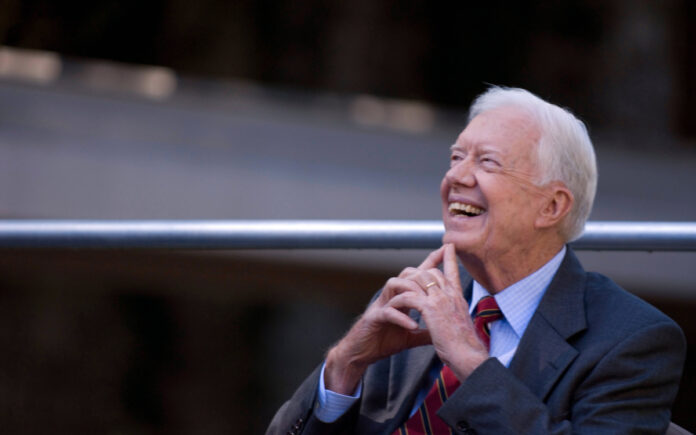Washington: Jimmy Carter, the former U.S. president and Nobel Peace Prize laureate, passed away on Sunday at his home in Plains, Georgia. He was 100. A humble peanut farmer turned politician, Carter’s presidency was marked by significant highs and lows, leaving behind a legacy of peace, humility, and humanitarian dedication.
Former US President Jimmy Carter, who won the Nobel Peace Prize, has died at 100 https://t.co/CKnpzBlEgc pic.twitter.com/0Ss8MOIdmq
— Reuters (@Reuters) December 29, 2024
Carter, a Democrat, assumed office in January 1977 after defeating Republican incumbent Gerald Ford. His single term was highlighted by the Camp David Accords of 1978, which brought peace between Israel and Egypt, and is regarded as a pivotal moment in Middle Eastern diplomacy. However, his presidency faced challenges, including a struggling economy, high inflation, and the Iran hostage crisis, which spanned the last 444 days of his term.
Despite losing his bid for re-election to Republican challenger Ronald Reagan in 1980, Carter’s post-presidential years transformed his reputation. He became a global humanitarian icon, known for advocating human rights, resolving international conflicts, and tackling poverty and hunger. His work earned him the Nobel Peace Prize in 2002.
‘Today, America and the world lost an extraordinary leader, statesman and humanitarian,’ said President Joe Biden of Jimmy Carter, who died at 100. Here is what other world leaders had to say about the former president https://t.co/WiIG1bzdNC pic.twitter.com/7JYSI1N4C5
— Reuters (@Reuters) December 30, 2024
Tributes from Around the World
World leaders and dignitaries have paid homage to Carter’s life and legacy. Egyptian President Abdel Fattah al-Sisi lauded Carter’s role in achieving the historic peace agreement between Egypt and Israel, describing it as “etched in the annals of history.” The Carter Center announced public memorials in Atlanta and Washington, with a private interment to follow in Plains.
Challenges in Office
Carter’s presidency was defined by crises. The 1979 Iran hostage situation saw 52 Americans held captive, a stark blow to national morale. A failed rescue mission in April 1980 further tarnished his administration, culminating in the hostages’ release moments after Reagan’s inauguration. Domestically, Carter struggled with soaring energy costs and double-digit inflation, famously declaring the energy crisis “the moral equivalent of war.”
In foreign policy, Carter protested the Soviet invasion of Afghanistan by boycotting the 1980 Moscow Olympics and negotiated the Panama Canal Treaty. His achievements also included establishing full diplomatic relations with China and creating the Departments of Education and Energy.
Post-Presidency and Humanitarian Work
After leaving the White House, Carter founded the Carter Center in Atlanta, focusing on global election monitoring, disease eradication, and conflict resolution. His efforts in Ethiopia, Bosnia, and Haiti showcased his commitment to peace. A deeply religious man, Carter continued teaching Sunday school and authored over two dozen books on topics ranging from politics to faith.
Despite his humanitarian success, Carter occasionally faced criticism for his outspoken views, particularly on U.S. foreign policy under subsequent administrations. He was unafraid to critique decisions, including the Iraq War, and engaged in diplomatic efforts with North Korea and other nations.
Also Read | Yoon Suk Yeol Under Fire: Arrest Warrant Sought Over Controversial Martial Law
A Life of Dedication
Born on October 1, 1924, in Plains, Georgia, Carter graduated from the U.S. Naval Academy and served in the Navy before managing his family’s peanut business. He entered politics as Georgia’s governor before launching his underdog bid for the presidency in 1976. Married to Rosalynn Carter for over 70 years, the couple had four children and shared a lifelong commitment to service.
In his later years, Carter faced health challenges, including melanoma. He entered hospice care in February 2023 after declining further treatment. His wife, Rosalynn, passed away in November 2023 at age 96. Despite his frailty, Carter attended her memorial service, a poignant final chapter in their remarkable journey together.
Also Read | North Korea’s Kim Lauds New Fish Farm, Calls for Regional Development
Legacy
Carter’s life reflects a blend of humility, resilience, and service. His moral leadership and tireless advocacy for peace and human rights remain an enduring testament to his character. As the world mourns his loss, Carter’s contributions to diplomacy, social justice, and global well-being will not be forgotten.



